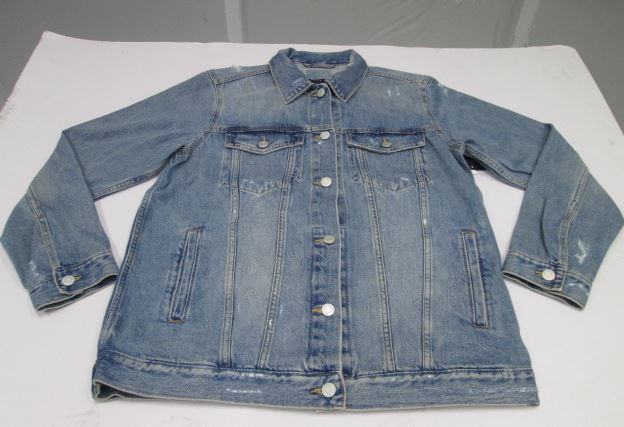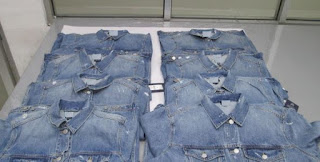How to Process washing Denim
 |
HOPEFULLY USEFUL ..........
Here are some of the washing techniques commonly used in denim
materials in both pants and shirt products.
- Garment Wash: The resulting color is navy blue (dark)
- Bio Wash: The resulting color is a medium blue, depending on the length of time the washing
- Bio Bleach: Because it uses a bleach substance that launches the indigo substance on the fabric, the color produced is light blue like the sky blue
- Stone Wash: color produced is medium blue, difference with bio wash washing effect between stitches nicer
Tink wash: Technically Tink wash is to input the color substance
that we want into the yarn weft denim fabric (it was not containing the color
substance). Substances can be arranged in accordance with the wishes. With a
fixed blue warp thread (can be arranged his young old with bio wash and bio
Bleach) produces a unique color that can not be obtained from non-denim
material
Retro: The principle of the same as Tink wash is to insert
a substance in a cloth containing cotton, but previously done bleaching process
(bleaching) so that the blue denim fabric on the worn yarn is lost, retro nudge
produces a solid color.
Sandblast: Done by spraying sand (sand) to garment products
that are still raw (not washed) using tools. The affected part of Sandblast has
a whiter effect compared to the products that are not exposed to sand blast
Scrapping: Manual washing techniques by using sandpaper to
"eject" cloth motif (usually a nice motive for disc rapping it's
motive slub and Crossfire) scrapping done with traditional by using sandpaper,
because it is done manually and done one by one pants (individual) scrapping
result for one product will be different with other products though in one
article. The resulting scrapping effect will be more natural than sandblast
Whipping: is an advanced process of scrapping, namely
giving the substance that emphasizes the fabric motif, so that the parts in the
scrap and whip are whiter compared to the parts that are not in the scrap and
whip. As with the scrapping technique, the Whipping technique is done manually.
Spray paint: It is a technique to give color to some parts of the
product by spraying the color substance into the desired part. For example, to
give the impression of ' dirty ' or ' old ' (long wearing) on the new pants.
Spay technique on the thighs with rusty color/rust
Destroy: As its name implies defective, the destroy
technique is done by ' damaging ' some parts of the product using grinders.
Usually the affected part is not until the hole (break the warp thread and the
pack) is just a little ripped, as well as in the pants that have long been
worn. Usually the part that is destroy is the top of the bag, knee, lower part
of the leg and thighs.
Crinkle: means folds, on some parts usually on leg, and
waist close to the front pockets. Given either a permanent or no crease effect
(only the former fold effect only) to produce the ' old ' effect.
Fitting on Dummy
Fitting on Dummy
Color check after washing
Effect washing
Quality Control on Washing:
1. Follow up start from sample
2. Preparation Bulk Production
- Check Fabric (cloth of the same or different from sample)
- Check Blanket, shade band (after and before Wash)
- Very important check master is grouping because this is where the shade lot will be specified
3. Bulk Production
- Trial Wash to see shrinkage, dye Migration, color fastness, and washing
- Make Approval Wash (make 3 pcs (buyer, laundry, factory))
- Test lot (test for quantity 1 machine)
- Road Washing production
- Check 10% @ Lot Engine
- If it is OK! Send factory, if reject! Return to laundry to rework
You May Also Like:
- Calibration Garment tape measurement
- During Production Inspection
- Top Garments defect
- Garments Pre-shipment Inspection
- How to Process Cutting on Garments
- How to Measure of Garments
- Needle Detector
- Process Sewing of Garments
- How to Process Washing Denim
- Quality Control Garments System
- Soft-Lines Pre-shipment Inspection
- Step how to setting QC and QA Garments





Belum ada Komentar untuk "How to Process washing Denim"
Posting Komentar